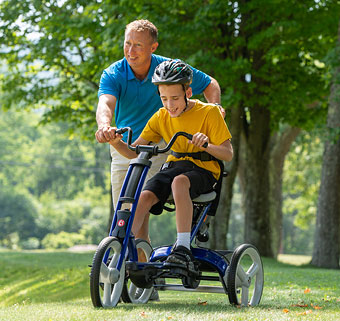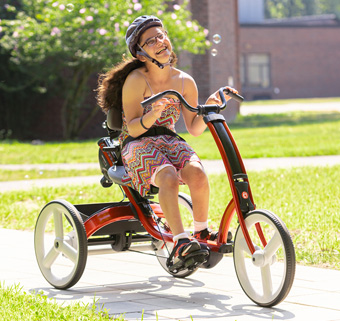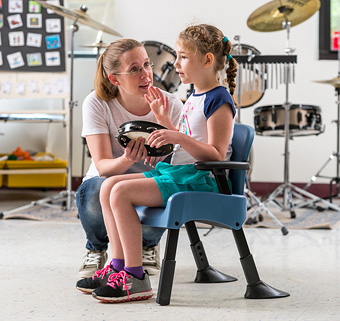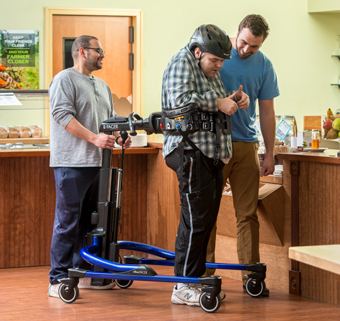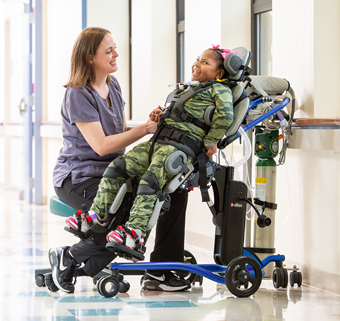The Nice F-Words for Children with Medical Complexity
| December 2022 For those of us working with medically fragile children we have our own set of F-words, and none of them unpleasant. Aligned in the framework of the International Classification of Functioning, Disability and Health (ICF), the F-words of Fitness, Function, Fun, Friends, and Family provide a lighthearted pathway to rehabilitation and a healthy future for children with disabilities.
For those of us working with medically fragile children we have our own set of F-words, and none of them unpleasant. Aligned in the framework of the International Classification of Functioning, Disability and Health (ICF), the F-words of Fitness, Function, Fun, Friends, and Family provide a lighthearted pathway to rehabilitation and a healthy future for children with disabilities.
Children with medical complexity (CMC) are a small sub-group of children with disabilities who demonstrate multisystem impairments resulting in considerable functional limitations and participatory restrictions.1 Frequent and extensive hospitalizations, primary and specialty physician visits, polypharmacy, medical equipment, rehabilitation, and care coordination are typical for these children and those of us who occupy their world.2, 3
Children with disabilities such as cerebral palsy display increased levels of sedentary behaviors and diminished physical and skill-based activities,4 so the Center for Disease Control and Prevention along with the World Health Organization strongly promotes physical activity for these adults and children.5, 6 Current guidelines recommend that children and adolescents with disabilities should engage in sixty minutes of moderate to vigorous physical activity per day.5, 6, 7, 8
When this is not possible, at least some activity is better than none.9 For children with medical complexity, evidence further supports using adaptive equipment to increase and support their activity efforts.10, 11 The ultimate objective is to allow children with disabilities full involvement and participation with friends in all activities and to increase the child’s social interaction.12, 13
Since its adoption by the World Health Organization in 2001 the ICF has served as a framework of health, acknowledging that functioning and disability of each individual occurs within the context of personal factors and the environment.14, 15 The F-words, developed by Rosenbaum and Gorter in 2012, offer a version of the ICF to apply this framework to the pediatric population.16 Using the F-word philosophy, we as pediatric therapists can improve physical activity and offer skilled-based opportunities to CMC. However, to do so safely, effectively, and successfully, we must recognize that the two supports of human assistance and adaptive equipment will be necessary. With this in mind, here is how I would characterize the F-words for CMC.

Image Credit: www.canchild.ca
Fitness for Body Functions and Structures
For CMC, fitness implies any movement or postural control while participating in light physical activity. For example, an initial expectation may be for a child to initiate and maintain postural control of the head while cycling on an adaptive cycle for five minutes. Over time, progression of the physical activity may lengthen the maintenance of postural control, extend the postural control into the thoracic region, or increase the cycling duration.

Function for Activity
For CMC, function will often take more basic forms. Instead of being expected to actively complete an entire functional activity, perhaps the child should be expected to complete only one element of the larger functional activity. For example, helping to stand during a transfer or toileting activity rather than being lifted by caregivers or placed in supine.
Friends for Participation
At the heart of participation for all children is engaging in activities with peers. It’s important to think carefully about designing activities in home, school, and community settings that encourage participation for children with medical complexity. For instance, using adaptive cycles to commute between home and school with neighborhood children, using a gait trainer to allow stepping during participation in a school play with other students, or joining a community soccer game with teammates.
Family for Environmental Factors
Family is at the heart of the environment in which CMC live, play, and learn. Each family brings a unique perspective to the incorporation of the F-words into daily life. So it is imperative that the pediatric therapist recognizes this central role of the family in order to optimize the health and well-being of such children.
Fun! For Personal Factors
While it may seem self-evident, it’s important to remind ourselves that enjoyment provides meaning to activities, and this is essential for safe, effective, and successful intervention outcomes.
Future
In the end, it’s all about the future, which is probably the most important F-word. For us clinicians, our entire focus is on how today’s intervention will affect tomorrow’s outcomes.
Take Home Message
So to bring it all together, I would capture the F-word continuum like this: Fitness + Function + Friends + Family + Fun will encourage a happy and healthy FUTURE for children with medical complexities.
References
- Cohen E, Kuo DZ, Agrawal R, Berry JG, Bhagat SK, Simon TD, et al. Children with medical complexity: An emerging population for clinical and research initiatives. Pediatrics. 2011;127(3): 529-38. Free Full Text https://www.ncbi.nlm.nih.gov/pmc/articles/PMC3387912/
- Berry J, Agrawal R, Cohen E, Kuo DZ. The landscape of medical care for children with medical complexity. Children’s Hospital Association, 2013.
- Berry JG, Agrawal R, Kuo DZ, Cohen E, Risko W, Hall M et al. Characteristics of hospitalizations for patients who use a structured clinical care program for children with medical complexity. The Journal of pediatrics. 2011; 159(2): 284-90. Free Full Text https://www.ncbi.nlm.nih.gov/pmc/articles/PMC3138997/
- Innes J, Darrah J. Sedentary behavior: implications for children with cerebral palsy. Pediatric physical therapy: the official publication of the Section on Pediatrics of the American Physical Therapy Association. 2013;25(4):402-408. Abstract https://pubmed.ncbi.nlm.nih.gov/23900023/
- Physical Activity for People with Disability. Center for Disease Control and Prevention. Updated January 4, 2022. Accessed October 28, 2022. https://www.cdc.gov/ncbddd/disabilityandhealth/features/physical-activity-for-all.html
- How much physical activity do children need? Centers for Disease Control and Prevention. Last reviewed June 3, 2022. Accessed November 1, 2022. https://www.cdc.gov/physicalactivity/basics/children/
- Bull FC, Al-Ansari SS, Biddle S, et al. World Health Organization 2020 guidelines on physical activity and sedentary behaviour. Br J Sports Med. 2020;54(24):1451-1462. doi:10.1136/bjsports-2020-102955. Free Full Text https://www.ncbi.nlm.nih.gov/pmc/articles/PMC7719906/
- Verschuren O, Peterson MD, Balemans AC, Hurvitz EA. Exercise and physical activity recommendations for people with cerebral palsy. Developmental medicine and child neurology. 2016;58(8):798-808. Free Full Text https://onlinelibrary.wiley.com/doi/10.1111/dmcn.13053
- Carty C, van der Ploeg HP, Biddle SJH, et al. The First Global Physical Activity and Sedentary Behavior Guidelines for People Living With Disability. J Phys Act Health. 2021;18(1):86-93. doi:10.1123/jpah.2020-0629. Free Full Text https://pubmed.ncbi.nlm.nih.gov/33395628/
- Majnemer A, Shevell M, Law M, et al. Participation and enjoyment of leisure activities in school-aged children with cerebral palsy. Developmental medicine and child neurology. 2008;50(10):751-758. Free Full Text https://onlinelibrary.wiley.com/doi/10.1111/j.1469-8749.2008.03068.x
- Bloemen MA, Backx FJ, Takken T, et al. Factors associated with physical activity in children and adolescents with a physical disability: a systematic review. Dev Med Child Neurol. 2015;57(2):137-148. doi:10.1111/dmcn.12624 Free Full Text https://onlinelibrary.wiley.com/doi/10.1111/dmcn.12624
- Koldoff EA. Parental perspectives on physical activity of adolescents with cerebral palsy: a pilot study. Journal of Research in Nursing. 2017;22(4):297-310. doi:10.1177/1744987117707804
- Mckenzie G, Willis C, Shields N. Barriers and facilitators of physical activity participation for young people and adults with childhood-onset physical disability: a mixed methods systematic review. Dev Med Child Neurol. 2021;63(8):914-924. doi:10.1111/dmcn.14830 Free Full Text https://onlinelibrary.wiley.com/doi/10.1111/dmcn.14830
- World Health Organization. International Classification of Functioning Disability and Health (ICF). 2001. https://www.who.int/standards/classifications/international-classification-of-functioning-disability-and-health Accessed November 2022.
- ICF E-learning Tool Glossary Terms. 2018. Retrieved from https://www.icf-elearning.com/ November 2022.
- Rosenbaum P, Gorter JW. The “F-words” in childhood disability: I swear this is how we should think!. Child Care Health Dev. 2012;38(4):457-463. doi:10.1111/j.1365-2214.2011.01338.x Free Full Text https://onlinelibrary.wiley.com/doi/10.1111/j.1365-2214.2011.01338.x
